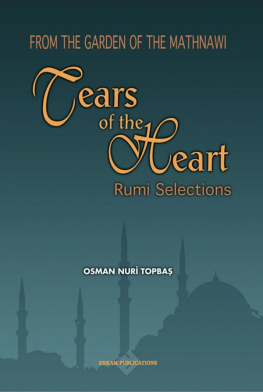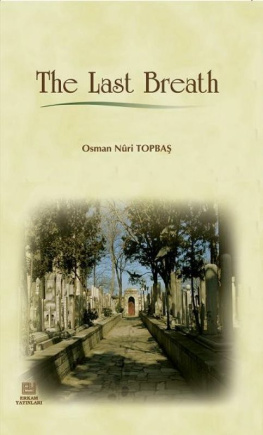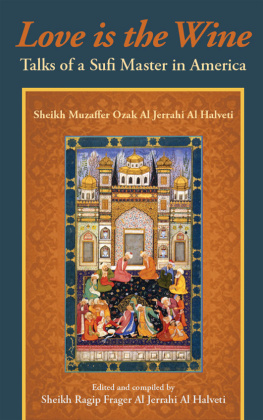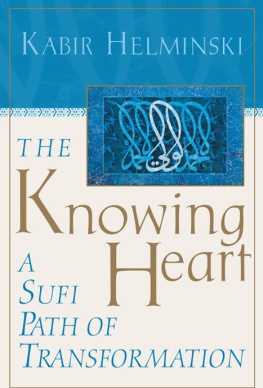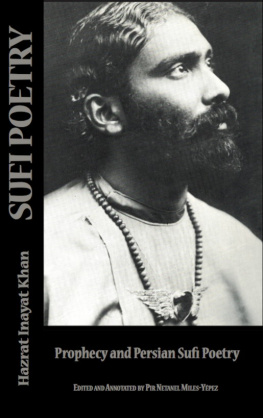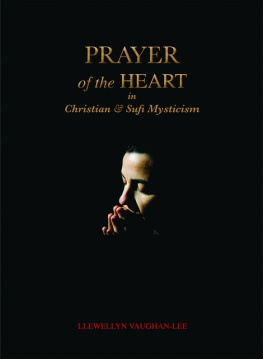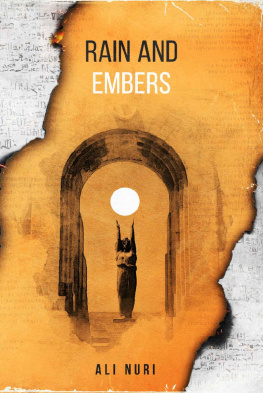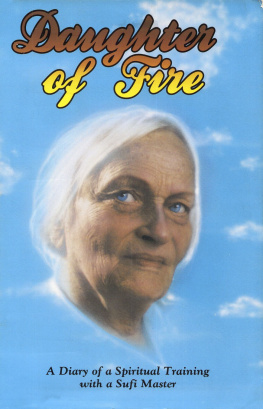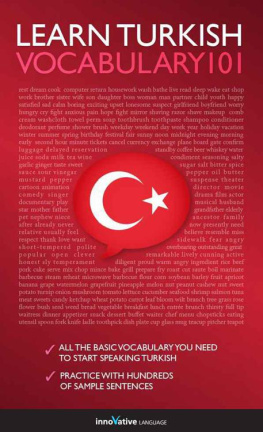Osman Nuri Topbas - Tears of the Heart
Here you can read online Osman Nuri Topbas - Tears of the Heart full text of the book (entire story) in english for free. Download pdf and epub, get meaning, cover and reviews about this ebook. year: 2010, publisher: Erkam Publishing, genre: Religion. Description of the work, (preface) as well as reviews are available. Best literature library LitArk.com created for fans of good reading and offers a wide selection of genres:
Romance novel
Science fiction
Adventure
Detective
Science
History
Home and family
Prose
Art
Politics
Computer
Non-fiction
Religion
Business
Children
Humor
Choose a favorite category and find really read worthwhile books. Enjoy immersion in the world of imagination, feel the emotions of the characters or learn something new for yourself, make an fascinating discovery.
- Book:Tears of the Heart
- Author:
- Publisher:Erkam Publishing
- Genre:
- Year:2010
- Rating:3 / 5
- Favourites:Add to favourites
- Your mark:
- 60
- 1
- 2
- 3
- 4
- 5
Tears of the Heart: summary, description and annotation
We offer to read an annotation, description, summary or preface (depends on what the author of the book "Tears of the Heart" wrote himself). If you haven't found the necessary information about the book — write in the comments, we will try to find it.
Tears of the Heart — read online for free the complete book (whole text) full work
Below is the text of the book, divided by pages. System saving the place of the last page read, allows you to conveniently read the book "Tears of the Heart" online for free, without having to search again every time where you left off. Put a bookmark, and you can go to the page where you finished reading at any time.
Font size:
Interval:
Bookmark:
From The Garden Of Mathnawi
TEARS OF THE HEART
RUMI SELECTIONS
Osman Nuri TOPBAS
Published by Erkam Publications at Smashwords
Copyright 2010 Erkam Publications
Smashwords Edition, License Notes
All rights reserved. No part of this publication may be reproduced, stored in a retrieval system, or transmitted in any form or by any means, electronic, mechanical, photocopying, recording or otherwise, without the prior permission of the copyright owner.
Erkam Publications
2005 / 1426 H
Ikitelli Organize Sanayi Bolgesi
Turgut Ozal Cd. No: 117/4
Ikitelli, Istanbul, Turkey
Tel: (90-212) 671-0700 pbx
Fax: (90-212) 671-0717
E-mail: english@altinoluk.com
Web site: http://www.islamicpublishing.net
Tranlators Sencer Ecer & Abdullah Penman

Table Of Contents
Praise be to Allah the Exalted who has blessed us, his powerless servants, with the joy and peace of true faith; and peace and blessings be on the Endless Pride of the Universe, Prophet Muhammad sallallahu alaihi wa sallam who has led humanity from darkness to boundless light.
May Allah grant our hearts a lofty fortune from the spiritual abode of the Companions of Prophet Muhammad and the revered friends of Allah, who have guided believers to the right path and may He bless our hearts with fruitful winds from the wide horizons of their infinite spirituality.
*
The honorable Mathnawi, composed more than seven hundred years ago by master Rumi in a vast state of love and ecstasy, has indeed come to occupy a unique place in the hearts of those searching for the Divine.
Just as the heart of a friend of Allah may not decay after death, so too those works of art that have emanated from such an incorrupt heart are immortal. After passing away, people with such refined hearts continue to live among us as they perform their services in the spiritual world. Their longevity transcends that of those who live only physically. Even if the transient physical bodies of their authors decompose in the grave and turn into dust, the works of their hearts, imbued with the fragrance of the eternal, will survive until the Day of Judgment.
Approaching the presence of the Lord through such spiritual fortune is only possible for those who have kept worldliness outside of their hearts; have not been enslaved by fame; and have totally submitted to the Divine will. The great master Rumi and his works, which are emanations from his heart, must be viewed in this manner.
In our history, the title sharif (honorable) is bestowed by our community on only three books, reflecting the illumined hearts of their authors: The first is the honorable Bukhari (Bukhari-i Sharif which is a collection of hadith); the second is the honorable Shifa (Shifa-i Sharif by Qadi al-Iyad which is a biography of Prophet Muhammad); and the third is the honorable Mathnawi (Mathnawi-i Sharif by Rumi which is a work of Sufi poetry). During the Ottoman period, these three magnificent texts were studied in mosques under the guidance of scholars authorized to teach by mentors that had in turn been chosen for their scholarly role by others similarly qualified and thus this chain of transmission continued back to the original author himself.
Among the incidents demonstrating the importance of these works is a spiritual dream Sheikh al-Islam Ibn Kemal Pasha had about the Mathnawi. He related the following:
In my dream I saw the Messenger of Allah sallallahu alaihi wa sallam. He was holding in his hand the Mathnawi and saying:
So many spiritual books have been composed. Yet, among these books, none is comparable to the Mathnawi.
While commenting on Rumi, the great master AbdurRahman Jami said:
What can I say about the greatness and the attributes of that friend of Allah? His Mathnawi is a matchless ocean of wisdom.
Indeed, the Mathnawi is an ocean of bottomless depth with boundless meaning and uncountable secrets. Few books can be found that explain the Sufi doctrine in such detail. Through his use of stories, spiritual subjects difficult to comprehend by the mind are able to deeply penetrate the heart of the reader.
Commentators have written of the Mathnawi:
The Quran begins with the command Read! while the Mathnawi begins with the command Listen! The latter is an explanation of the former. We are told: Listen to the divine word! Listen to its secrets! Listen to the truth hidden within you! In other words, breezes emanating from the Mathnawi, originating in the truth and secrets of the glorious Quran, fan the fire of spiritual love in the hearts of students on the spiritual path.
The Mathnawi is a poetic embodiment of Rumis inner world reflected in couplets and is a book of rich blessing filled with great gifts of fortune. Although an esoteric account of the divine journey Rumi began under the supervision of Shams al-Tabrizi, it has nevertheless been written according to the needs and degree of understanding of ordinary people. It is a record of unceasing cries and tears borne of his inner suffering traceable to the loss of his teacher Shams and his subsequent inability to find anyone suitable with whom to share his spiritual struggles.
The great master Rumi has described the Mathnawi as follows:
The Mathnawi is a path of light for those who want to attain the Truth, understand divine secrets, and become familiar with them.
The city of Konya has taken from Rumi its color and harmony. It has enjoyed his blessings for seven centuries. It seems that Rumi, the Mathnawi, and Konya are synonymous. If one is mentioned, the other is immediately recalled.
Rumi quddisa sirruh bequeathed a great gift to humanity by recording as a book the spiritual journey of his illumined, feeling heart. The entire content of the Mathnawi is summarized in the following couplet:
If you have a heart, make tawaf (i.e. the ritual of walking in circles around the Kaaba) around it! Spiritually speaking, the real Kaaba, not the worldly one made of stone and dust, is the heart.
Allah has made it obligatory to perform tawaf around the tangible Kaaba so that one might attain to a pure and cleansed Kaaba of the heart.
Through the mercy of Allah, Rumi penetrated to the very depth of the human soul and thus was able to witness its unveiled inner workings. Through the sheer radiance of that vision, the text penetrates the secrets of creation that unfolded before his inner eye:
I became a servant, became a servant, and became a servant
I, the powerless servant, became ashamed for failing to fulfill my servanthood. Therefore, I put my head down
Every servant becomes happy if set free. O my Lord! I am in joy because I am your servant.
These expressions give us a taste for the depth of enthusiasm and joy emanating from his servanthood to Allah. As an extension of this, let us not fail to remember that Allah the Almighty has revealed His aim in the creation of man as follows:
I have only created Jinns and human beings so that they may serve me (Zariyat, 56).
*
The Mathnawi is a conversation between Rumi and his student Husameddin. It opens through his contact with Husameddin and by virtue of their association moves forward. If one were to depart, the current flowing between them would cease to circulate. When they would re-unite, their hearts would once again be swollen with currents of spiritual joy and the couplets would again flow.
The great master Rumi quddisa sirruh said: I composed this Mathnawi in such a way that it suits Husameddin. This statement is actually a lament for not being able to express his secret as his heart desired due to the loss of the ocean of love named Shams. Had Rumi written the Mathnawi as a conversation with Shams, who knows what great secrets would have manifested in its couplets through the burning songs that would have erupted from it?
Next pageFont size:
Interval:
Bookmark:
Similar books «Tears of the Heart»
Look at similar books to Tears of the Heart. We have selected literature similar in name and meaning in the hope of providing readers with more options to find new, interesting, not yet read works.
Discussion, reviews of the book Tears of the Heart and just readers' own opinions. Leave your comments, write what you think about the work, its meaning or the main characters. Specify what exactly you liked and what you didn't like, and why you think so.

